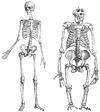- Great Ape Project
-
Great Ape Project 
Founder(s) Peter Singer and Paola Cavalieri Founded 1994 Focus Animal rights Motto Campaigning to extend to non-human great apes the protection of the right to life and individual liberty, and the prohibition of torture. Website Great Ape Project The Great Ape Project (GAP), founded in 1994, is an international organization of primatologists, anthropologists, ethicists, and other experts who advocate a United Nations Declaration of the Rights of Great Apes that would confer basic legal rights on non-human great apes: chimpanzees, bonobos, gorillas, and orangutans. The rights suggested are the right to life, the protection of individual liberty, and the prohibition of torture. The organization also monitors individual great ape activity in the United States through a census program. Once rights are established, GAP would demand the release of great apes from captivity; currently 3,100 are held in the U.S., including 1,280 in biomedical research.
Contents
Great Ape Project (book)
The book of the same name, edited by philosophers Paola Cavalieri and Peter Singer, features contributions from thirty-four authors, including Jane Goodall and Richard Dawkins, who have submitted articles voicing their support for the project. The authors write that human beings are intelligent animals with a varied social, emotional, and cognitive life. If great apes also display such attributes, the authors argue, they deserve the same consideration humans extend to members of their own species.
The book highlights findings that support the capacity of great apes to possess rationality and self-consciousness, and the ability to be aware of themselves as distinct entities with a past and future. Documented conversations (in sign languages) with individual great apes are the basis for these findings. Other subjects addressed within the book include the division placed between humans and great apes, great apes as persons, progress in gaining rights for the severely mentally retarded (once an overlooked minority), and the situation of great apes in the world today.
Their biological similarity with humans is also key to the traits for which they are valuable as research subjects. For example, testing of monoclonal antibody treatments can not be done in species less similar to humans than chimpanzees. Because the antibodies do not elicit immune responses in chimpanzees, they persist in the blood as they do in humans, and their effects can be evaluated. In monkeys and other non-apes, the antibodies are rapidly cleared from the bloodstream. Monoclonal antibody treatments are being developed for cancer; autoimmune diseases such as rheumatoid arthritis, lupus erythematosis, multiple sclerosis, psoriasis, and Crohn's disease; and asthma. Chimpanzees also contain unique advantages in evaluating new Hepatitis B and C vaccines, and treatments for malaria, again because of the similarity in their response to these antigens to humans.[1]
Declaration on Great Apes
The Great Ape Project is campaigning to have the United Nations endorse a Declaration on Great Apes.[2] This would extend what the project calls the "community of equals" to chimpanzees, bonobos, gorillas and orangutans. The declaration seeks to extend to non-human great apes the protection of three basic interests: the right to life, the protection of individual liberty, and the prohibition of torture.
Right to life
The declaration states that members of the community of equals, which includes humans, may not be killed except in certain strictly defined circumstances such as self-defense.
Protection of individual liberty
The declaration states that members of the community of equals are not to be deprived of their liberty, and are entitled to immediate release where there has been no form of due process. Under the proposed declaration, the detention of great apes who have not been convicted of any crime or who are not criminally liable should be permitted only where it can be shown that the detention is in their own interests or is necessary to protect the public. The declaration says there must be a right of appeal, either directly or through an advocate, to a judicial tribunal.
Prohibition of torture
The declaration prohibits the torture, defined as the deliberate infliction of severe pain, on any great ape, whether wantonly or because of a perceived benefit to others. Under International Human Rights Law this is a jus cogens principle and under all major human rights documents it cannot at any time be derogated by any State.
Opposition
Professor Colin Blakemore, head of the Medical Research Council in Great Britain from 2003–2007, is opposed to granting rights to non-human apes, stating "I can see no current necessity for the use of great apes, and I'm pleased that they're not being used and that every effort is being made to reduce the use of other primates. But I worry about the principle of where the moral boundaries lie. There is only one very secure definition that can be made, and that is between our species and others." Blakemore suggests that it would be necessary to perform research on great apes if humans were threatened by a pandemic virus that afflicted only humans and other great apes. [3]
See also
- Great Ape personhood
- International primate trade
- Nafovanny
- Non-human primate experiments
- Great Ape Trust
- Animal rights
Notes
- ^ A unique biomedical resource at risk. Nature 437, 30-32 (1 September 2005) | doi:10.1038/437030a;
- ^ Declaration on Great Apes, Great Ape Project
- ^ Connor, Steve. [1] Scientists 'should be allowed to test on apes'], The Independent, June 3, 2006.
Further reading
- The Great Ape Project, accessed May 22, 2006.
- The Great Ape Project: Equality beyond humanity. 1993. Editors, Peter Singer and P. Cavalieri., Fourth Estate publishing, London, England. Pp. 312.
- Peter Singer. 1993. Practical Ethics. 2nd ed. Cambridge University Press, New York, U.S.A. Pp.395.
- Peter Singer. 2002. Animal Liberation. HarperCollins, New York, U.S.A. Pp.324.
- New Scientist 19 May 2003 - Chimps are human, gene study implies
Ape-related articles Ape species 
Ape study Ape language · Ape Trust · Dian Fossey · Birutė Galdikas · Jane Goodall · Chimpanzee genome project · Human genome project · Neanderthal genome project · Willie Smits · Lone Drøscher Nielsen · Borneo Orangutan SurvivalLegal and social status See also Bushmeat · Ape extinction · List of notable apes · List of fictional apes · Human evolution · Mythic humanoids · HominidInstitutions Education centers Research Primatology • Gombe Stream National Park • Kasakela Chimpanzee Community • Leakey's Angels • Great Ape Project • Ape extinctionOther work Awards Kyoto Prize (1990) • Hubbard Medal (1995) • William Procter Prize for Scientific Achievement (1996) • Community of Christ International Peace Award (1999) • Gandhi–King Award (2001) • Huxley Memorial Medal (2002) • United Nations Messenger of Peace (2002) • Dame of the British Empire (2003) • Global Environmental Citizen Award (2003) • Légion d'honneur (2006)Honorary degreesSyracuse University (2005) • Uppsala University (2007) • University of Liverpool (2007) • University of Toronto (2008)Categories:- Animal rights movement
- Jane Goodall
Wikimedia Foundation. 2010.
